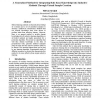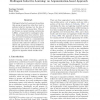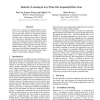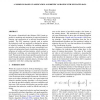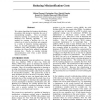142
click to vote
CORR
2011
Springer
14 years 9 months ago
2011
Springer
Hybrid learning methods use theoretical knowledge of a domain and a set of classified examples to develop a method for classification. Methods that use domain knowledge have been ...
121
click to vote
ICML
2010
IEEE
15 years 3 months ago
2010
IEEE
Multiagent Inductive Learning is the problem that groups of agents face when they want to perform inductive learning, but the data of interest is distributed among them. This pape...
111
click to vote
AAAI
1996
15 years 3 months ago
1996
This article advocates a new model for inductive learning. Called sequential induction, it helps bridge classical fixed-sample learning techniques (which are efficient but difficu...
114
click to vote
IJCAI
2003
15 years 3 months ago
2003
Most recent research of scalable inductive learning on very large dataset, decision tree construction in particular, focuses on eliminating memory constraints and reducing the num...
114
click to vote
AAAI
2006
15 years 3 months ago
2006
Both explanation-based and inductive learning techniques have proven successful in a variety of distributed domains. However, learning in multi-agent systems does not necessarily ...
107
click to vote
WSC
2008
15 years 4 months ago
2008
We present a Generalized Lotka-Volterra (GLV) based approach for modeling and simulation of supervised inductive learning, and construction of an efficient classification algorith...
128
click to vote
ICML
1994
IEEE
15 years 5 months ago
1994
IEEE
We explore algorithms for learning classification procedures that attempt to minimize the cost of misclassifying examples. First, we consider inductive learning of classification ...
109
click to vote
CBMS
2006
IEEE
15 years 8 months ago
2006
IEEE
Inductive learning systems have been successfully applied in a number of medical domains. It is generally accepted that the highest accuracy results that an inductive learning sys...
110
Voted
ICML
2000
IEEE
16 years 2 months ago
2000
IEEE
This paper introduces a foundation for inductive learning based on the use of higher-order logic for knowledge representation. In particular, the paper (i) provides a systematic i...
